Items filtered by date: October 2024
Damage to Nerves in the Foot
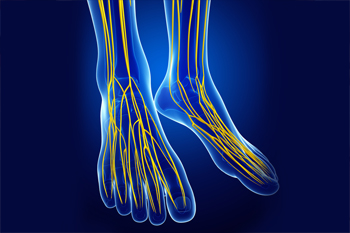
Nerve damage in the foot can cause significant pain, often due to irritation of the nerves between the bones of the toes, known as interdigital nerves. This condition is commonly linked to neuromas, which are benign growths that often develop between the third and fourth toes. Factors contributing to formation of neuromas include wearing tight or non-supportive footwear, thinning of the protective fat pad at the ball of the foot, and structural abnormalities that put additional pressure on the nerves. Nerve pain in the foot starts with mild aching, tingling, or burning in the toes. However, it can progress to a constant burning sensation that makes it difficult to wear closed-toe shoes. A podiatrist can offer relief by recommending proper footwear, prescribing custom orthotics, or administering injections to reduce inflammation and pain. In more severe cases, surgery may be needed to remove the neuroma. This may provide pain relief but may also cause numbness. If you are experiencing nerve pain in your feet, it is suggested that you schedule an appointment with a podiatrist for a treatment plan that works best for you.
Neuropathy
Neuropathy can be a potentially serious condition, especially if it is left undiagnosed. If you have any concerns that you may be experiencing nerve loss in your feet, consult with one of our podiatrists from Palmetto Podiatry Group of Anderson. Our doctors will assess your condition and provide you with quality foot and ankle treatment for neuropathy.
What Is Neuropathy?
Neuropathy is a condition that leads to damage to the nerves in the body. Peripheral neuropathy, or neuropathy that affects your peripheral nervous system, usually occurs in the feet. Neuropathy can be triggered by a number of different causes. Such causes include diabetes, infections, cancers, disorders, and toxic substances.
Symptoms of Neuropathy Include:
- Numbness
- Sensation loss
- Prickling and tingling sensations
- Throbbing, freezing, burning pains
- Muscle weakness
Those with diabetes are at serious risk due to being unable to feel an ulcer on their feet. Diabetics usually also suffer from poor blood circulation. This can lead to the wound not healing, infections occurring, and the limb may have to be amputated.
Treatment
To treat neuropathy in the foot, podiatrists will first diagnose the cause of the neuropathy. Figuring out the underlying cause of the neuropathy will allow the podiatrist to prescribe the best treatment, whether it be caused by diabetes, toxic substance exposure, infection, etc. If the nerve has not died, then it’s possible that sensation may be able to return to the foot.
Pain medication may be issued for pain. Electrical nerve stimulation can be used to stimulate nerves. If the neuropathy is caused from pressure on the nerves, then surgery may be necessary.
If you have any questions, please feel free to contact our office located in Anderson, SC . We offer the newest diagnostic and treatment technologies for all your foot care needs.
Itchy Feet May Be a Cause for Concern
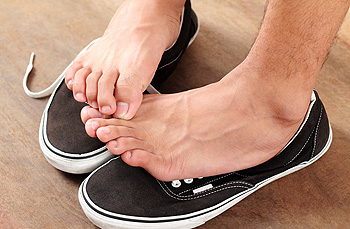
Itchy feet can be bothersome, but may also indicate an underlying issue that needs medical attention. The causes of itchy feet include fungal or bacterial infections, contact with allergens, or dry skin. In some cases, persistent itchiness can be linked to systemic conditions, like diabetes, thyroid problems, or kidney disease. If you experience itching along with other symptoms, like blisters, scaling, or redness, it may be time to seek professional help. A podiatrist can conduct a thorough exam to diagnose the root cause of the itchiness and develop a plan to bring relief and prevent complications. Quick action helps reduce the risk of further irritation or potential infections. It is suggested to avoid scratching, as it can worsen the symptoms and potentially lead to skin damage. If you have uncommonly itchy feet, it is suggested that you schedule an appointment with a podiatrist for an exam and treatment.
Everyday foot care is very important to prevent infection and other foot ailments. If you need your feet checked, contact one of our podiatrists from Palmetto Podiatry Group of Anderson. Our doctors can provide the care you need to keep you pain-free and on your feet.
Everyday Foot Care
Often, people take care of their bodies, face and hair more so than they do for their feet. But the feet are a very important aspect of our bodies, and one that we should pay more attention to. Without our feet, we would not be able to perform most daily tasks.
It is best to check your feet regularly to make sure there are no new bruises or cuts that you may not have noticed before. For dry feet, moisturizer can easily be a remedy and can be applied as often as necessary to the affected areas. Wearing shoes that fit well can also help you maintain good foot health, as well as making it easier to walk and do daily activities without the stress or pain of ill-fitting shoes, high heels, or even flip flops. Wearing clean socks with closed shoes is important to ensure that sweat and bacteria do not accumulate within the shoe. Clean socks help to prevent Athlete’s foot, fungi problems, bad odors, and can absorb sweat.
If you have any questions please feel free to contact our office located in Anderson, SC . We offer the newest diagnostic and treatment technologies for all your foot and ankle needs.
Recovering from Morton's Neuroma Surgery
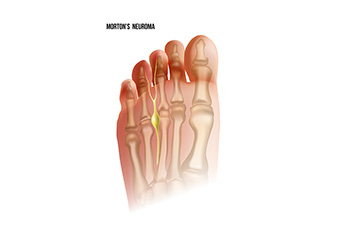
Recovery from Morton's neuroma surgery typically involves a gradual process that emphasizes rest and rehabilitation. Initially, patients may need to keep weight off the foot for a few days to reduce swelling and discomfort. By the end of the first week, many can begin gentle range-of-motion exercises to promote flexibility. After two to four weeks, most individuals can gradually reintroduce weight-bearing activities, but high-impact exercises should be avoided until cleared by a podiatrist. Strengthening exercises can be incorporated around the four to six-week mark, focusing on improving stability and muscle support. Wearing appropriate footwear is critical during recovery to ensure comfort and prevent further irritation. If you have Morton's neuroma, it is strongly suggested that you consult a podiatrist who can determine if this type of foot surgery is right for you.
Morton’s neuroma is a very uncomfortable condition to live with. If you think you have Morton’s neuroma, contact one of our podiatrists of Palmetto Podiatry Group of Anderson. Our doctors will attend to all of your foot care needs and answer any of your related questions.
Morton’s Neuroma
Morton's neuroma is a painful foot condition that commonly affects the areas between the second and third or third and fourth toe, although other areas of the foot are also susceptible. Morton’s neuroma is caused by an inflamed nerve in the foot that is being squeezed and aggravated by surrounding bones.
What Increases the Chances of Having Morton’s Neuroma?
- Ill-fitting high heels or shoes that add pressure to the toe or foot
- Jogging, running or any sport that involves constant impact to the foot
- Flat feet, bunions, and any other foot deformities
Morton’s neuroma is a very treatable condition. Orthotics and shoe inserts can often be used to alleviate the pain on the forefront of the feet. In more severe cases, corticosteroids can also be prescribed. In order to figure out the best treatment for your neuroma, it’s recommended to seek the care of a podiatrist who can diagnose your condition and provide different treatment options.
If you have any questions, please feel free to contact our office located in Anderson, SC . We offer the newest diagnostic and treatment technologies for all your foot care needs.
Plantar Warts Can Be Treated!
Debridement of Diabetic Foot Wounds
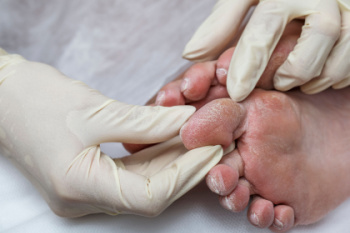
Debridement of diabetic wounds is a critical procedure in wound care management, particularly for patients with diabetic foot ulcers. Diabetic wounds often heal slowly due to poor circulation and high blood sugar levels, leading to the buildup of dead or infected tissue that can hinder the healing process. Debridement involves the removal of this dead tissue, allowing healthy tissue to grow and promoting faster healing. This procedure reduces the risk of infection by eliminating bacterial growth in the wound, which can otherwise lead to more severe complications, including amputation. Debridement also improves the effectiveness of other treatments, such as dressings and medications, by creating a cleaner environment for wound healing. If you have diabetic foot wounds, it is strongly suggested that you visit a podiatrist to see if regular debridement sessions, in addition to proper diabetes management, can help prevent serious complications related to your condition.
Wound care is an important part in dealing with diabetes. If you have diabetes and a foot wound or would like more information about wound care for diabetics, consult with one of our podiatrists from Palmetto Podiatry Group of Anderson. Our doctors will assess your condition and provide you with quality foot and ankle treatment.
What Is Wound Care?
Wound care is the practice of taking proper care of a wound. This can range from the smallest to the largest of wounds. While everyone can benefit from proper wound care, it is much more important for diabetics. Diabetics often suffer from poor blood circulation which causes wounds to heal much slower than they would in a non-diabetic.
What Is the Importance of Wound Care?
While it may not seem apparent with small ulcers on the foot, for diabetics, any size ulcer can become infected. Diabetics often also suffer from neuropathy, or nerve loss. This means they might not even feel when they have an ulcer on their foot. If the wound becomes severely infected, amputation may be necessary. Therefore, it is of the upmost importance to properly care for any and all foot wounds.
How to Care for Wounds
The best way to care for foot wounds is to prevent them. For diabetics, this means daily inspections of the feet for any signs of abnormalities or ulcers. It is also recommended to see a podiatrist several times a year for a foot inspection. If you do have an ulcer, run the wound under water to clear dirt from the wound; then apply antibiotic ointment to the wound and cover with a bandage. Bandages should be changed daily and keeping pressure off the wound is smart. It is advised to see a podiatrist, who can keep an eye on it.
If you have any questions, please feel free to contact our office located in Anderson, SC . We offer the newest diagnostic and treatment technologies for all your foot care needs.
Fabry Disease and the Feet
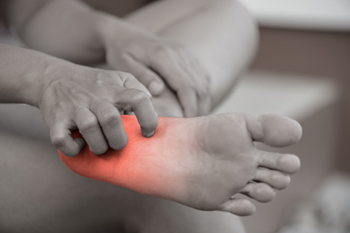
Fabry disease is a rare genetic disorder caused by the buildup of a fat-like substance called globotriaosylceramide due to a deficiency of the enzyme alpha-galactosidase A. This buildup affects various parts of the body, including the heart, kidneys, nervous system, and skin. In terms of foot involvement, Fabry disease can cause burning pain, tingling, and numbness, primarily due to nerve damage, or neuropathy in the feet. This discomfort often becomes worse by physical activity or heat. Diagnosis involves blood tests to measure enzyme levels, genetic testing to confirm mutations, and tissue biopsies to detect GL-3 accumulation. Early diagnosis is imperative as symptoms can progress. If you have foot discomfort or neuropathy, it is strongly suggested that you schedule an appointment with a podiatrist for a proper diagnosis and treatment to help relieve symptoms.
When dealing with systemic disease of the feet, it is extremely important to check the affected areas routinely so that any additional problems are caught quickly. If you have any concerns about your feet and ankles contact one of our podiatrists from Palmetto Podiatry Group of Anderson. Our doctors will assist you with all of your podiatric needs.
Systemic Diseases of the Feet
Systemic diseases affect the whole body, and symptoms usually are displayed in the feet. This condition can make a patient’s ability to walk unbearable. Systemic diseases include gout, diabetes mellitus, neurological disorders, and arthritis.
Gout – is caused by an excess of uric acid in the body. Common symptoms include pain, inflammation, and redness at the metatarsal/phalangeal joint of the base big toe. Gout can be treated by NSAIDs to relieve pain and inflammation, and other drugs that lower the acid levels in the body.
Diabetes mellitus – is an increase in the level of blood sugar that the body cannot counteract with its own insulin. Failure to produce enough insulin is a factor in Diabetes.
Diabetes of the Feet
Diabetic Neuropathy – may lead to damaged nerves and affect the feet through numbness and loss of sensation.
Peripheral Vascular Disease – can restrict the blood flow to the feet, and often times lead to amputation of the feet.
If you have any questions please feel free to contact our office located in Anderson, SC . We offer the newest diagnostic and treatment technologies for all your foot and ankle needs.

